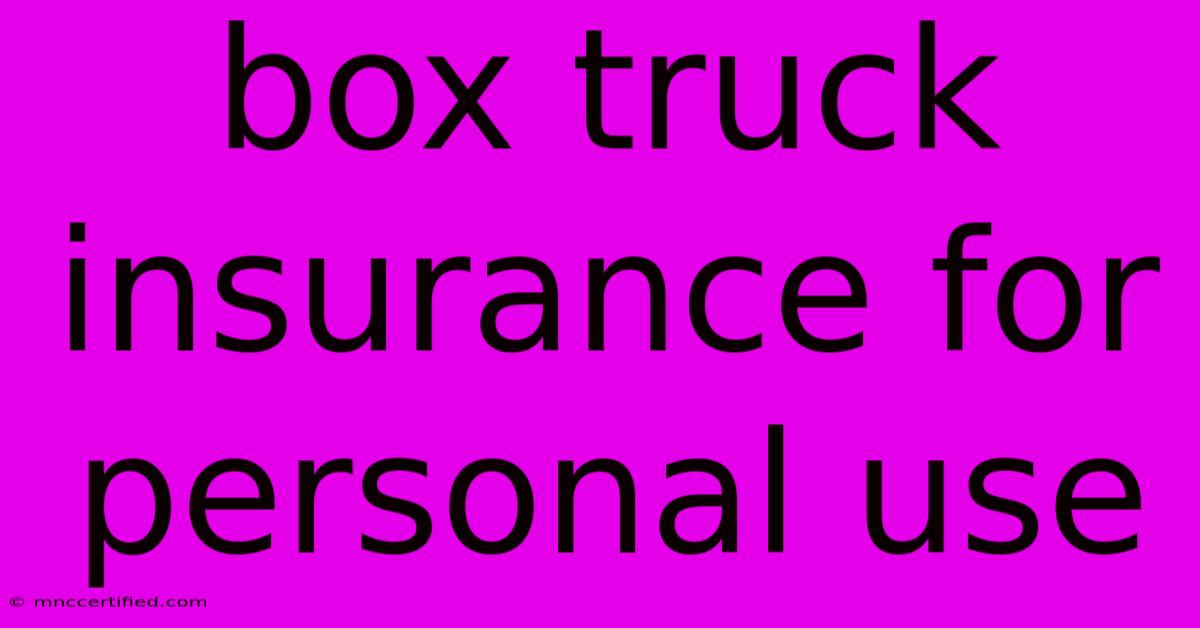Box Truck Insurance For Personal Use

Table of Contents
Box Truck Insurance for Personal Use: Navigating the Essentials
Owning a box truck for personal use can be a great asset for moving, hauling large items, or even starting a small business. But before you hit the road, it's crucial to understand the insurance requirements and nuances specific to personal box truck usage. This guide will break down the key aspects of box truck insurance for personal use, ensuring you're covered and prepared for the road ahead.
Understanding the Basics: What You Need to Know
Box trucks, being larger commercial vehicles, fall under different insurance categories than your standard passenger car. Here's a breakdown of the essential insurance types you'll need to consider:
- Liability Insurance: This is the most basic requirement and covers damage or injuries you cause to other vehicles or people in an accident. State minimums vary, but you'll likely need higher liability limits than for a personal car due to the potential for more significant damage.
- Collision Coverage: This protects your truck from damage caused by an accident, regardless of who is at fault. It's optional, but highly recommended to ensure you can repair or replace your truck in the event of a collision.
- Comprehensive Coverage: This covers damage to your truck caused by things like theft, vandalism, fire, or natural disasters. It's another optional but essential component, especially if your truck is a significant investment.
- Uninsured/Underinsured Motorist Coverage: This protects you in case you're hit by someone without adequate insurance or who flees the scene. It's crucial for added peace of mind, especially when sharing the road with other vehicles.
Personal vs. Commercial: Key Differences
While you might be using your box truck for personal purposes, it's essential to differentiate between "personal" and "commercial" usage for insurance purposes. Here's why:
- Commercial Use: If you use your box truck for any paid work, deliveries, or transporting goods for profit, you'll need commercial insurance. This includes higher coverage limits, potentially different policy terms, and potentially higher premiums.
- Personal Use: Using your box truck for moving belongings, occasional errands, or non-profit activities falls under personal use. However, even with personal use, ensure your insurance company is aware of how you'll be using the truck to avoid potential claims issues.
Finding the Right Coverage: Tips and Considerations
Here are some tips for securing the right box truck insurance for personal use:
- Shop Around: Get quotes from multiple insurance companies to compare rates and coverage options.
- Consider Discounts: Ask about available discounts like safe driving records, multiple-vehicle policies, or good credit scores.
- Check Coverage Limits: Don't settle for the minimum liability limits, especially considering the increased risk associated with a larger vehicle.
- Be Transparent: Be upfront with your insurance company about how you plan to use the truck. Accurate information will ensure you have appropriate coverage.
Staying Safe and Insured
Owning a box truck can be a convenient and powerful tool for personal use. But remember, your insurance plays a vital role in protecting you and your investment. By understanding the nuances of personal box truck insurance, you can navigate the roads with confidence and peace of mind.

Thank you for visiting our website wich cover about Box Truck Insurance For Personal Use. We hope the information provided has been useful to you. Feel free to contact us if you have any questions or need further assistance. See you next time and dont miss to bookmark.
Featured Posts
-
Chelsea Vs Arsenal Live Stream Premier League
Nov 11, 2024
-
Strategic Limited Partners Insurance
Nov 11, 2024
-
49ers Beat Buccaneers 23 20 Four Takeaways
Nov 11, 2024
-
Man Utd 3 0 Leicester Premier League Result
Nov 11, 2024
-
Anti Bullying Week Stand Up For Respect
Nov 11, 2024